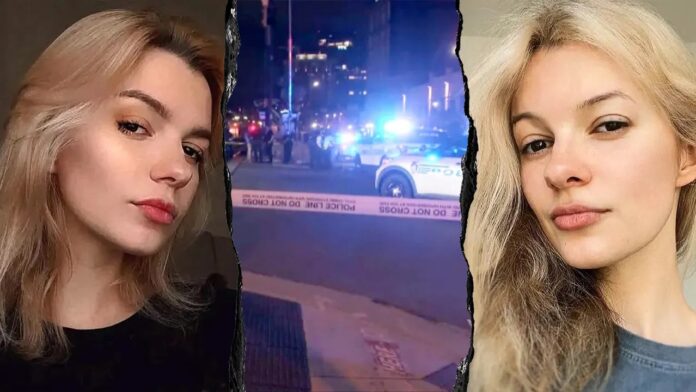EARLY: Friends Recall Iryna Zarutska's Last Shift at the Pizzeria, Where Her Uniform Still Hangs in the Locker — But There's a Handwritten Note Pinned Inside
In the quiet aftermath of a tragedy that has shaken Charlotte, North Carolina, and rippled across the nation, friends and colleagues of Iryna Zarutska are sharing intimate memories of her final hours at Zepeddies Pizzeria. The 23-year-old Ukrainian refugee, who fled the horrors of war in her homeland only to meet a senseless end on a light rail train, left behind more than just a void in the hearts of those who knew her. At the bustling south Charlotte eatery where she worked as a line cook, her uniform — a simple black T-shirt and khaki pants emblazoned with the restaurant's logo — remains untouched in her locker. Pinned to the inside is a handwritten note, a poignant artifact that has colleagues whispering about its contents and what it reveals about the young woman's spirit. As the investigation into her August 22, 2025, murder continues, these recollections paint a picture of resilience, warmth, and unfulfilled dreams.

Iryna Zarutska's path to Zepeddies was one of determination and adaptation. Arriving in the U.S. in 2022 with her mother and two younger siblings, she sought refuge from the Russian invasion that had forced her family into bomb shelters in Kyiv. Settling in North Carolina, Iryna quickly threw herself into building a new life. She enrolled in English classes at a local community college, worked multiple jobs — including at an assisted living facility in Huntersville and a sandwich shop — and advanced rapidly at the pizzeria from an entry-level position to a trusted line cook. “She was always smiling, always eager to learn,” recalled one coworker, who asked to remain anonymous out of respect for the ongoing grief. “Iryna had this way of making the kitchen feel lighter, even on the busiest nights.”
On that fateful Friday evening, August 22, Iryna's shift at Zepeddies ran until just before 10 p.m. Friends describe it as a typical night: the aroma of fresh dough and marinara sauce filling the air, the clatter of pans and chatter among the staff. Iryna, her long blonde hair tucked under a Zepeddies cap, moved with efficiency and grace, flipping pizzas and bantering with regulars. “She was excited about the weekend,” shared Maria Gonzalez, a fellow line cook and close friend. “Iryna had just saved up for her first car and was practicing driving with her boyfriend. She told me, ‘Maria, soon I'll drive us all to the beach!' We laughed about it during our break.” Another colleague, Jamal Thompson, remembered her generosity: “She'd share her tips with newer staff or bring in homemade Ukrainian treats for everyone. That girl had a heart of gold.”
As the shift wound down, Iryna clocked out, still in her uniform — the black T-shirt slightly stained from the night's rush, khakis neatly pressed as always. Surveillance footage from the Charlotte Area Transit System (CATS) later captured her boarding the Blue Line light rail at Scaleybark station around 9:46 p.m., earbuds in, scrolling through her phone. She sat unaware of the danger behind her: Decarlos Brown Jr., a 34-year-old man with a lengthy criminal history including schizophrenia and multiple arrests for violent crimes. After about four and a half minutes, Brown allegedly pulled a knife from his pocket and stabbed her three times, including in the neck. Iryna collapsed, bleeding out on the train floor despite attempts by other passengers to render aid. Brown fled at the next stop but was arrested soon after, charged with first-degree murder and a federal count related to violence on public transit.
Back at Zepeddies, the news hit like a thunderbolt. The restaurant closed early the next day, and staff gathered in stunned silence. Owner Tony Zepeddi issued a heartfelt statement on social media: “We lost not only an incredible employee, but a true friend. Our dear Iryna left this world far too soon, and our hearts are heavy with grief.” Since then, a candle has burned continuously in her memory at the pizzeria, symbolizing “the warmth, kindness, and light she brought to our lives every day.” But it's the untouched locker that has become a focal point of mourning. Iryna's uniform hangs there, a silent sentinel of her presence, as if waiting for her return. “We couldn't bear to move it,” Gonzalez explained in an interview with local outlet WCNC. “It's like she's still here, ready for her next shift.”
Pinned inside the locker door is the handwritten note — a small, folded piece of paper that Iryna had taped up weeks earlier. Colleagues describe it as a personal mantra, scrawled in her neat handwriting with a touch of her artistic flair; she was a talented illustrator who had graduated from Synergy College in Kyiv with a degree in art and restoration. While the exact contents remain private, out of respect for the family, friends have hinted at its uplifting message. “It was something about gratitude and pushing forward,” Thompson shared. “She wrote it after a tough day, reminding herself — and maybe us — to keep going. Reading it now… it breaks you.” The note, they say, reflects Iryna's optimistic outlook: despite the challenges of immigration, language barriers, and grueling work hours, she focused on the positive. “She dreamed of becoming a veterinary assistant because she loved animals so much,” Gonzalez added. “That note was her way of staying motivated.”

Social media has amplified these stories, turning personal tributes into a broader conversation about loss and safety. On X (formerly Twitter), posts recalling Iryna's last shift have gone viral, with users like @VladTheInflator tweeting: “Iryna Zarutska was working at a pizzeria… still wearing her uniform on her way home before being slaughtered… Imagine escaping a war-torn country only to be butchered like an animal.” Others, such as @YuriySteblak, expressed heartbreak: “An innocent refugee from my home country… May the vile animal who murdered Iryna Zarutska rot in hell.” These accounts highlight not just grief but frustration over systemic failures — Brown's repeated releases from custody despite his history of violence, including a five-year prison stint for robbery with a deadly weapon, and the lack of security on the train that night.
The pizzeria's tribute extends beyond words. Staff have organized a memorial fund, with proceeds going to Iryna's family, who are still reeling. Her uncle, speaking anonymously to PEOPLE magazine, described her as the “glue” of the family: “She was a comforter, always helping others.” Iryna's boyfriend, in a raw interview with the New York Post, lamented the “unqualified” judicial decisions that allowed Brown back on the streets. “She was my everything,” he said. The family has declined to repatriate her remains, believing she would want to stay in the U.S., the country she had come to love. Her funeral, attended by over 100 people including pizzeria colleagues, featured heartfelt eulogies and her artwork displayed prominently.
This story has ignited calls for reform. Charlotte Mayor Vi Lyles condemned the “senseless and tragic” attack, and CATS announced plans to expand police patrols on the light rail. A Change.org petition for better transit security has garnered thousands of signatures. Mental health advocates point to Brown's untreated schizophrenia as a cautionary tale, urging more resources amid limited hospital beds and stigma in the region. Politically, former President Donald Trump demanded the death penalty for Brown, while critics lambast “woke” policies for prioritizing criminals over victims.
As friends gather at Zepeddies, sharing stories of Iryna's laughter and kindness, the locker stands as a shrine. The uniform and note serve as reminders of a life interrupted — a young woman who escaped bombs in Ukraine only to face random violence in America. “What was in that note? It was her hope,” Gonzalez reflected. “And now, it's our call to action.” In honoring Iryna, her colleagues vow to keep her light burning, pushing for a world where no one's last shift ends in tragedy. Her story, from the pizzeria's warm kitchen to the cold train platform, underscores the fragility of safety and the enduring power of human connection
